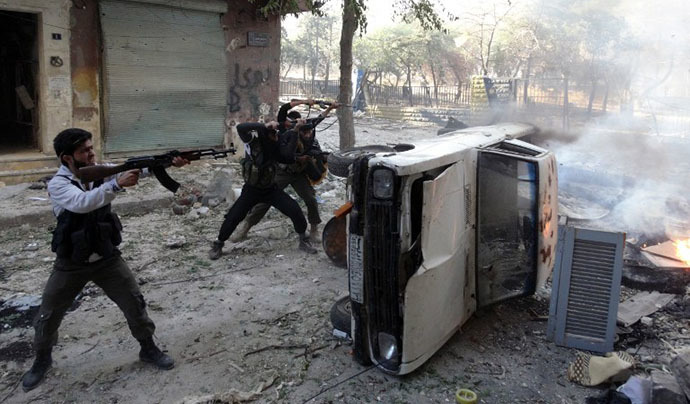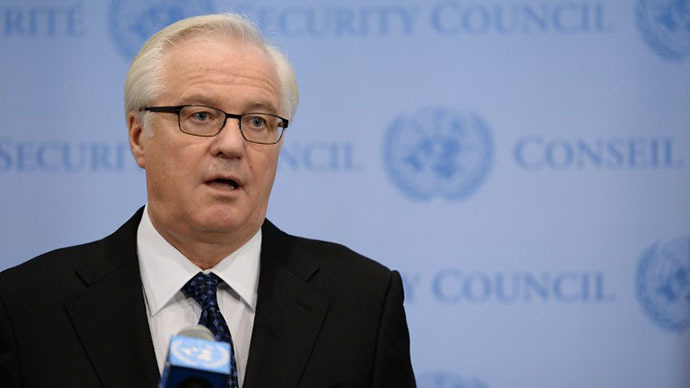While building up a case against the Syrian government, the US has relied on the sophisticated filtration of information and manipulation of public opinion through carefully weighted statements with no hard proof, Russian UN envoy Vitaly Churkin said.
“Our requests for additional information which could prove
the Syrian government involvement in the use of chemical weapons
were ignored by Washington,” Ambassador Vitaly Churkin said
after a closed-door UN Security Council (UNSC) meeting on two UN
chemical weapons reports by Ake Sellstrom.
The sarin attacks near Aleppo on March 19 and in Ghouta on August
21 are the two most “alarming” incidents of the Syrian
conflict, Churkin told reporters, adding that the story becomes
“full of contradictions” if blame is placed on the
Syrian government.
"Why would the Syrian government use chemical weapons on
August 21?" Churkin said. "To cross the red line drawn
by Washington and invite a missile strike upon itself?Why would the opposition use chemical weapons? Exactly
because of the red line.To provoke foreign military
intervention in the Syrian conflict.”
The August 21 attack was a provocation by the rebels, Churkin
believes, noting that Sellstrom’s investigation got acquainted
with the OPCW-certified (Organisation for the Prohibition of
Chemical Weapons) report. He added that the UN team did not
refute the results found by Russian experts in the report.
The Russian team’s analysis concluded that
“home-made” sarin was used near Aleppo on March 19. It
stated that the sarin was likely delivered by a crudely made
missile. The team also named the particular opposition group most
likely behind the attack.

At the time, the Syrian government immediately
requested an international investigation of the March 19
incident, Churkin reminded, but “then the United Kingdom and
France all of a sudden recalled a Homs case, that had not
bothered them for 3 preceding months, while the US started
insisting on the need to investigate ‘all incidents.’”
“Why did those who accused the Syrian government of this act
did their utmost to derail or at least delay such
investigation?” Churkin wondered, reminding how the dragging UN probe was interfered by the tragic
events in Ghouta on August 21.
“As our experts concluded, sarin used on August 21 was of
approximately the same type as the one used on March 19, though
of a slightly better quality. It means that over a few months
opposition chemists somewhat improved the quality of their
product,” Churkin said.
In his speech, the UN envoy also said that some US experts
determined that the projectile use in the August incident was
“an improvised one and could be manufactured in a
machine-shop, while the range of the rocket could not exceed 2
km,” which means that “it was launched from the
territory controlled by opposition.”
Yet despite the August 21 tragedy that killed over 1,400 people,
the US and its allies have blamed the Syrian government for the
atrocity in Ghouta, with Washington releasing a four-page
document containing only “hints and assertions but no real
evidence.” Moscow’s request for further evidence showing the
government’s involvement in the attacks was ignored by the US,
Churkin stated.
“The lack of any proof was particularly strange since, as the
public learnt from media reports based on Edward Snowden's
materials, the US had powerful intelligence assets in Syria:
sensors capable to provide in real time information on any mixing
of precursors by the Syrian troops for sarin production,” he
said.
And a public warning against chemical weapons sent out
by President Obama following a 2012 Syrian military drill
proves the US had such early warning systems, Churkin added.
Considering sarin’s fast degradation, it cannot be produced long
in advance, Churkin reminded, refuting allegations that “the
US knew that the Syrians for a few days in advance of August 21
were preparing for a chemical attack.” He said the US used
“sophisticated filtration of information and manipulation of
public opinion” to build the case, similar to that in
preparation for the Iraq war.
“Indeed one needs to read carefully President Obama's statement
of September 10,” Churkin explained. “[Obama] says: ‘In
the days leading up to August 21, we know that Assad's chemical
weapons personnel prepared for an attack near an area where they
mix sarin gas.’” That is, "we know" as of September 10 - not in
the days that preceded August 21.”
Churkin gave his assessment of the events citing an article by
Pulitzer Prize-winning journalist Seymour Hersh. The “US
administration simply extrapolated to the situation of August 21
their understanding of how the Syrian military were supposed to
act in preparation for the use of chemical weapons,” he
said.
Churkin concluded that the “US had no information at
all,” prior to the August attack. “It is clear why: the
sensors stayed silent because no chemical agents were mixed to
produce sarin. But if sarin was not being produced then the
Syrian government troops did not have it for use on August
21.”
Citing Hersh, Chrukin asserted that Washington instead knew for
“several months” prior to the Ghouta incident that the
opposition “had learnt how to produce sarin and was capable
of manufacturing it in quantity,” based on a US intelligence
assessment. That could be why, Churkin argues, the US did not
provide chemical protection gear to the opposition, since the
“US administration feared that the opposition groups would
resort to the use of the chemical weapons once they got the
protective gear.”
In conclusion, Churkin said it is “absolutely obvious that on
August 21 a large-scale provocation was staged.”
Washington did not immediately comment on Churkin's statement,
but Reuters sources said that American Ambassador Samantha Power
told the Russian envoy behind closed doors that a “Christmas
vacation might do the Russian ambassador good.” Churkin told
Reuters it “was not a very polite comment to make.”
The US representative also told the Security Council meeting that
the “Russian regime has a remarkable trust in a government
that sends rockets at and bombs its own population,” to
which Churkin replied that Moscow determines its position based
on fact assessment.
Meanwhile, French Ambassador to the United Nations Gerard Araud
said the meeting was an “acrimonious exchange.” British
Ambassador Mark Lyall Grant attacked Russia’s stance in a tweet,
comparing it to a “giant squid.”
#Syria CW in #UNSC: Russia uses Giant Squid Defence - squirt lots of ink in attempt to muddy waters on regime culpability. Doesn't work.
— Mark Lyall Grant (@LyallGrant) December 16, 2013
Syrian Ambassador Bashar Jaafari said that Washington “cannot
be an arsonist and a fireman at the same time,” as Russia
and the US are attempting to broker a peace conference in Geneva.
The UNSC session followed the first briefing from UN Secretary
General Ban Ki-moon on the final report of a UN inspection team
that was released on Friday, which concluded that poison gas was
likely used in five out of seven investigated incidents in Syria.
But the team did not have the mandate to say which side was
responsible for the attacks.
Also on Monday, Russia announced that it is ready to provide its
navy ships to accompany European vessels transporting Syrian
chemical weapons. Russian Foreign Minister Sergey Lavrov made the
announcement after a meeting with EU ministers in Brussels.
It has been agreed that the US will neutralize 500 tons of chemical components which can be used to make mustard gas and sarin aboard an American ship in international waters.
According to Lavrov, “a range of EU states” have offered their ships to transport these components to the site where they will be destroyed. The Russian minister underlined that the elimination of Syria’s chemical weapons stockpile will be carried out in full accordance with ecological norms.

